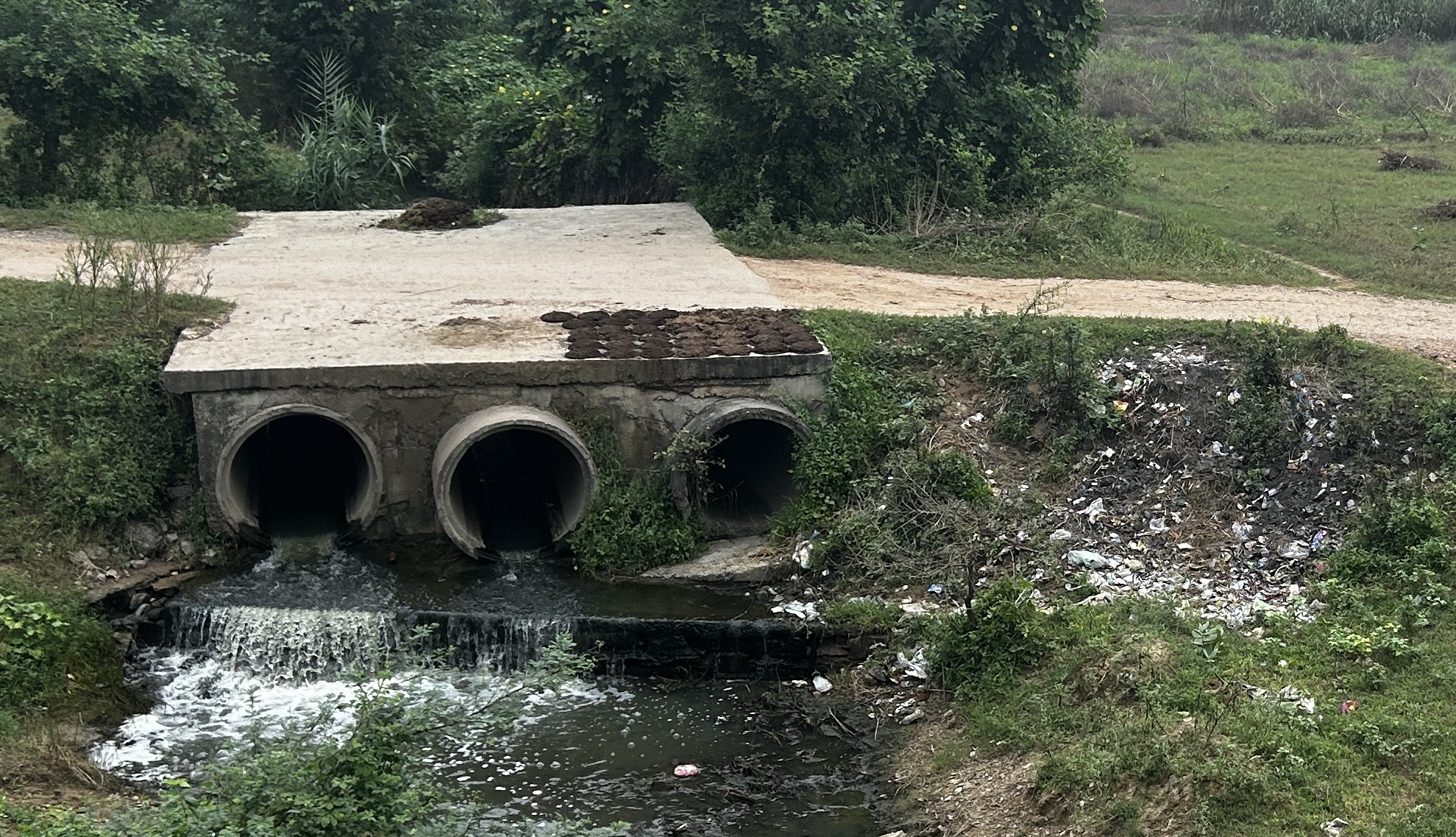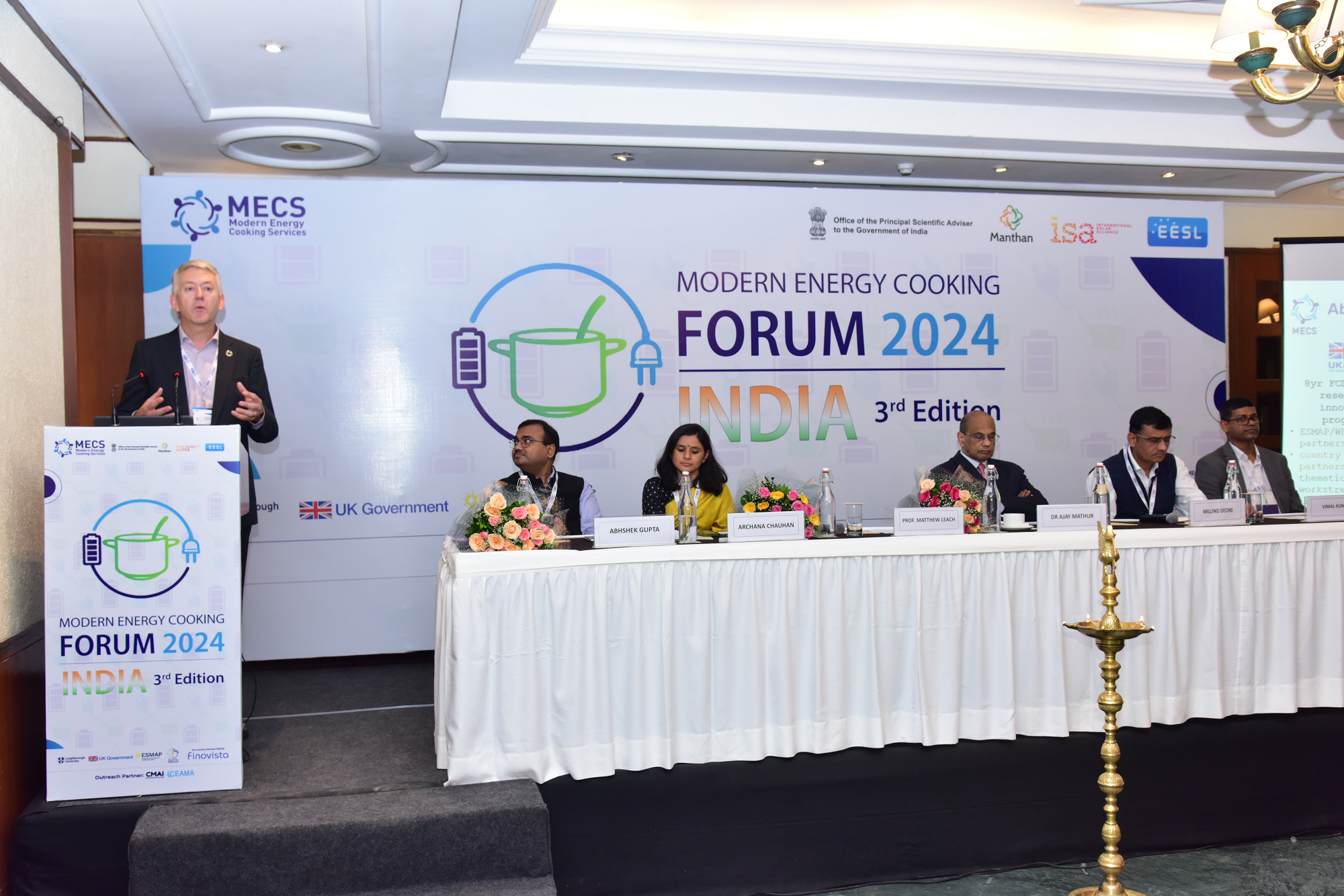
- Date
- 17th December 2024
- Categories
- Clean Cooking
By Dr Nick Rousseau (Loughborough University) and Prof. Matthew Leach (Gamos Ltd.)
We recently had a trip to India attending the fourth annual MEC Forum on the Friday and having a series of meetings the following week with Finovista.
This was only Matt’s second trip to India, with the first being four years ago for the launch of MECS work in India. The growth in numbers of people attending the Forum, numbers of devices showcased, and the energy in the room since that launch were striking. Finovista, and with them MECS, are at the centre of an expanding web of electric cooking work in India, with central ministries and major organisations largely convinced, and enthusiasm now spreading into the states. Whilst India has famously already come close to universal clean cooking through subsidising LPG, there is growing acknowledgment that many households, especially in rural areas, aren’t actually using it, and the country can’t afford the ongoing import bill. The strategy is changing and eCooking is intended to have a significant role.


This highly productive trip (thanks to Finovista, as ever) has resulted in some new insights and understanding of the Indian context and opportunities, and some concrete actions and projects to take forward.
As ever, we are on a learning journey and that is both collective learning where we study an aspect or setting and write a report that can be shared, and individual learning where one of us has an AHAH! moment and something that might seem to be obvious to others suddenly makes sense and helps to frame the mindset that we bring to our work.
In this blog post we focus on one such “Ahah” moment for Nick…
Another way to frame the journey to success
In the run-up to going to India, Nick had been working on a fresh way of looking at what MECS is seeking to achieve. At its simplest, this breaks it down to the journey that is needed at the level of the individual cooking setting (household/institution/eatery). For electric cooking this would be:
- Acquisition of eCooking appliance(s)
- Starting to make use of these and gradually incorporating this into the regular practice
- Expanding the use of eCooking to the point where the bulk of cooking uses electricity
The full benefits of eCooking will only be achieved if the cook gets to stage 3.
Nick is developing this framework into tools to help support action planning and prioritisation. There are three elements to that:
- What are the factors that help a household progress along the journey, vs those that hinder it? (using a Snakes and Ladders metaphor seems to work here – especially appropriate given that the game was invented in India!)
- What trajectories can we plot that show how these factors in the environment are changing, and that could indicate which ones could be altered to create a more conducive environment?
- Which organisations/stakeholders in the ecosystem have the best potential to become active partners and champions for what is needed and influence these factors and how they change over time?
The biomass ecosystem
As an example of how this works, on this trip, we heard a lot about the challenges associated with getting to stage 3 for domestic homes, in particular regarding the shift away from substantial use of biomass. We have already recognised that this is a long-term challenge and the journey from stage 1 to 3 is likely to take years. The Ahah moment was around the extent to which, in the Indian context, there is a huge informal ecosystem that supports biomass-based cooking.
In advance of the trip, Nick read two fascinating studies that took an ethnographic approach to building a deep understanding of how women source biomass for cooking. The key insights could be summarised as:
- The familiar image of a woman walking along a road carrying a bundle of firewood on her head is a huge over-simplification of what happens – there is a lot more to this than such a conception reveals
- Women are amazingly able to find multiple ways to secure fuels to enable them to cook for their families, using networks and “jugaad” (frugal innovation) to ensure they always have a ready supply of what they need. This is deeply built into the social structures of their communities.
Another study of women in rural India focused on the beliefs of different groups – those that cook solely with firewood and those that use LPG. They report that women who use firewood report a range of benefits from this that positively impact on their well-being including the opportunities for social contact as they gather it.
Further, observations and comments were made during the trip that added detail to this:
- Women in households are skilled optimisers selecting on a day-by-day basis what is the best cooking option reflecting a wide range of considerations. Even in urban areas they will have a variety of routes to securing biomass, including holding stock that can be readily available.
- In rural areas, agricultural waste, especially cow dung, is constantly being produced and needs to be put to some use. Studies have found that it is available in such huge quantities that its energy potential is huge. If unused it would build up problematically. This creates a further pressure to use it for cooking, despite the huge environmental and health damage. During the COVID epidemic there was even widespread adoption of using cow dung in an attempt to protect against the disease.
This highlights that seeing the challenge of achieving a shift from biomass-based cooking to eCooking is much more than just an economic challenge, but a deeply cultural shift. It will be important to understand the values of women in particular and consider how needs that can be met from firewood collection can be replaced, as well as helping educate them about the harm that results from cooking with biomass.
It also suggests that interventions into the biomass ecosystem should be as important as those that focus on promoting eCooking. For example, eCooking take-up could therefore be supported by successful introduction of other ways of valorising agricultural waste so that it is no longer a “free” fuel. India has extensive efforts to prevent farmers burning stubble given the air pollution it generates and one approach is to offer farmers an alternative use for this material that needs to be removed such as finding ways it could be converted into clean energy with a value in a market, even potentially as biogas or aircraft fuel.
So, looking at these insights using the framework described above:
- A key factor that hinders the adoption of cleaner cooking is the ready availability of biomass and the need for households to make use of it
- The change in biomass availability, value and usage options over time could be a key part of the ecosystem that we should be plotting (although in practice this is a highly localised factor)
- Finally, organisations that might make use of biomass for purposes other than cooking could be valuable partners as they could build an incentive structure that works with the push to clean cooking rather than what is currently working against it.
We would be interested to hear of other analyses of clean cooking challenges and opportunities that can be framed in this way.
…………………………….
Featured photo, top: Dung cakes drying (photo credit: Nick Rousseau, MECS).